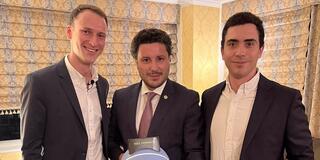Lessons from Montenegro

Editor's Note: Dritan Abazović was Montenegro's prime minister at the time this interview was conducted. A new prime minister took office on October 31.
During the United Nations General Assembly high level week 2023, I interviewed the prime minister of Montenegro, Dritan Abazović. Born in 1985 on the southern coast of Montenegro, Abazović is one of the youngest heads of government in the world. Over the course of his youth he experienced the war period in the Balkan region, and, finally in 2006, Montenegro’s independence, which came when he was 20 years old.
Abazović said his engagement in regional reconciliation initiatives during his high school and college years compelled him to make a contribution on the national stage. That’s what he ultimately did — first helping to establish a new political party (from which he later split), then gaining election as the youngest member of parliament, and eventually helping to shape Montenegro’s democratic journey.
As one who aspires to someday hold a position of leadership, I find Abazovic's personal journey to be of particular interest. But I believe that my fellow students — along with countries and policy makers from around the world — can also learn from Montenegro’s experiences.
Three issues guided our conversation: climate change and the environment, membership in the European Union, and lessons for democratic institution-building in a post-conflict environment. As the first and only country in the world that is by constitution dedicated as an ecological state, Abazović introduced the pilot role that Montenegro can play in a global economic and ecological transformation. He sees the potential of Montenegro as a green destination.
Joining the EU is the most important foreign policy goal that Abazović has set for Montenegro, which already belongs to NATO. He has emphasized that the “western Balkan should not be the black hole of Europe.” His country applied for EU membership in 2008 and accession negotiations have been ongoing since 2012. According to Abazović, Montenegro is well-positioned for EU membership as the only country in the western Balkans with good relations with all its neighboring countries. Reforms to institutions and the rule of law are being implemented. Abazović sees Montenegro as the perfect country for the revival of EU expansion.
In his 2022 speech at the UN, Abazović spoke about the importance of achieving positive peace instead of negative peace. As a scholar of political science — he earned a doctorate from the University of Sarajevo, in neighboring Bosnia and Herzegovina — Abazović has dealt with this question in his recent book A Critique of Global Ethics. The western Balkan countries are still in the transition from negative to positive peace –Abazović sees the cosmopolitan spirit and the promotion of universal values as the core of this transition. Small and large countries alike, as well as the UN, have an obligation to contribute to this process, Abazović says, noting that UN reform is key to achieving this goal in today’s world.
Sebastian Espinosa MIA ’24 supported me in filming this interview.